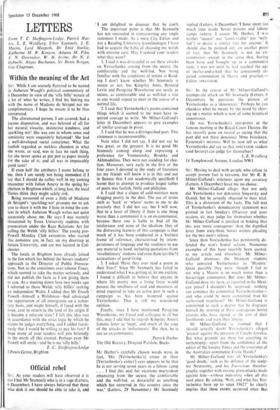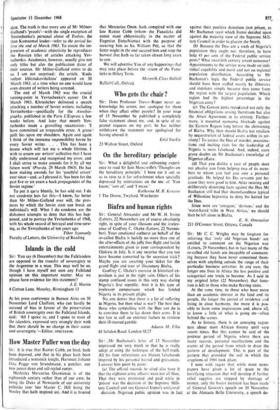Sir: Having to deal with people who refuse to accept
proven fact is tiresome, but Mr R. R. Milner-Gulland's strictures upon my accuracy (Letters, 6 December) leave me no choice.
Mr Milner-Gulland alleges that not only did Yevtushenko not denounce Sinyavsky and Daniel, but he actually objected to their trial. This is a distortion of the facts. The full text of Yevtushenko's denunciatory statement was printed in last Sunday's Observer and your readers, sir, may judge for themselves whether Mr Milner-Gulland is justified in holding that this was 'more courageous' than the dignified letter from sixty-three Soviet writers pleading for the two men's release.
Since then Yevtushenko has persistently de- fended the KGB'S brutal actions. Numerous examples of this have recently been quoted, in my article and elsewhere. Mr Milner-
Gulland dismisses the Mexican students who censured Yevtushenko as 'Maoists.'
Quite possibly they were---though I fail to see why a Maoist is so much worse than a Soviet-type communist. But does Mr Milner-
Gulland deny facts, as reported in the Mexi- can press? I shouldn't be surprised: nothing can convince the committed Yevtushenkoites- and who could be more committed than his authorised translator? Mr Milner-Gulland is committed to such a degree that he disgraces himself by sneering at those courageous Soviet citizens who have signed. at the cost of their livelihoods and even their liberty.
Mr Milner-Gulland is stunned that I should actually doubt Yevtushenko's alleged 'protest against the invasion of Czechoslovakia. But what grounds are there tor accepting its authenticity—apart from the confidence of the editor of the Sunday Times and the assurance of the Australian communist Frank Hardy?
Mr Milner-Gulland lists all Yevtushenko's 'good deeds,' such as his defence of the sculp- tor Neizvestny, and his Precocious Autobio- graphy, together with various press attacks made against him—without indicating when all this took place. By asking, 'Well, and what has Yev- tushenko been up to since 1962?' he clearly implies that these events occurred since that date. The truth is that every one of Mr Milner. Gunand's `proofs'—with the single exception of Yevtushenko's personal abuse of Pavlov, the
then Komsomol leader—refer to the period be- fore the end of March 1963. To create the im-
pression of academic objectivity he reproduces the Russian titles of articles attacking Yev- tushenko. Academics, however, usually give not only titles but also the publication dates of their sources. Mr Milner-Gulland -omits to do so. I am not surprised: the article, 'Kuda vedyot khlestakovshchina' appeared on 30 March 1963, at a time when no one would have even dreamt of writers being arrested.
The end of March 1963 was the crucial turning-point in Yevtushenko's career. On 8 March 1963, Khrushchev delivered a speech attacking a number of Soviet writers, including Yevtushenko—specifically for the Autobio;. graphy, published in the Paris L'Express a few weeks before. And• later that - month Yev- tushenko made a grovelling recantation : 'I have committed an irreparable error. A grave guilt lies upon my shoulders. Again and again 1 think of the immense responsibility borne by every Soviet writer. . . . This has been a lesson which will last me a whole lifetime. I wish to assure our writers' collective that I have fully understood and recognised my error, and I shall strive to make amends for it by all my future work' (Pravda. 29 March 1963). He has been making amends for his 'youthful errors' ever since—and, as I phrased it, 'has been for the past five or six years a hack propagandist of the Soviet regime.'
- To put it quite bluntly, he has sold out. I do not condemn him for this—I know, far better than Mr Milner-Gulland ever will, the ores- Cures by which the Soviet state can break an individual's will. What I do condemn are the dishonest attempts to. deny that this has hap- pened, and to portray the Yevtushenko of 1968, with his whole record of betrayal and time-serv- ing, as the Yevtushenko of ten years ago.















































 Previous page
Previous page